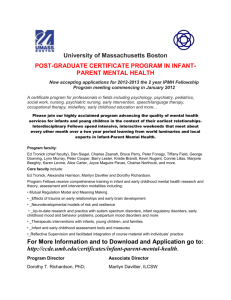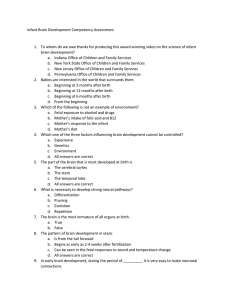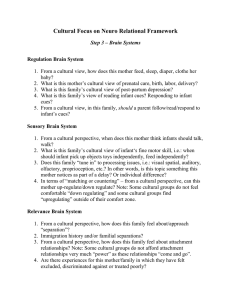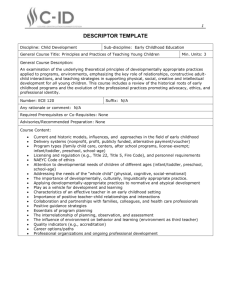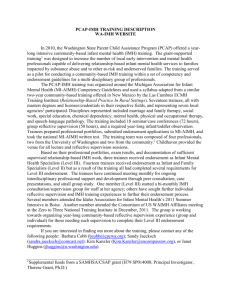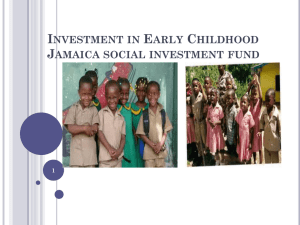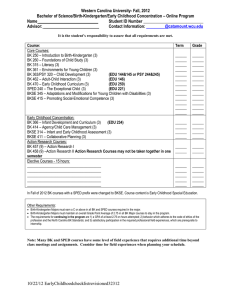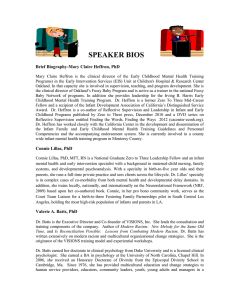Overview and Orientation Workshop California Competencies & Foundations of Infant
advertisement
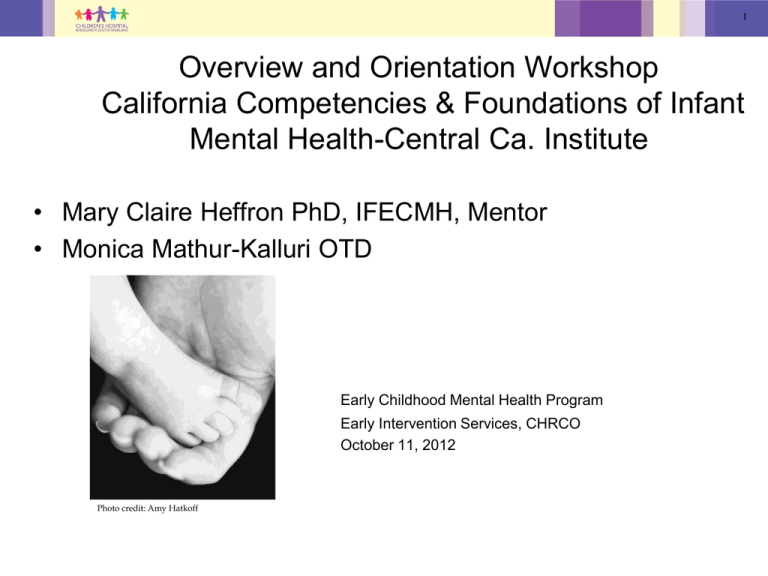
1 Overview and Orientation Workshop California Competencies & Foundations of Infant Mental Health-Central Ca. Institute • Mary Claire Heffron PhD, IFECMH, Mentor • Monica Mathur-Kalluri OTD Early Childhood Mental Health Program Early Intervention Services, CHRCO October 11, 2012 Photo credit: Amy Hatkoff 2 Infant-Family and Early Childhood Mental Health Infant mental health is defined as “a broad-based, multidisciplinary, and international effort to enhance the social and emotional well-being of young children…which includes the efforts of clinicians, researchers and policymakers.” Zeanah & Zeanah Handbook of Infant Mental Health, 3rd Edition, 2009 3 Family-Centered practitioners FAMILIES & COMMUNITIES policymakers researchers 4 Centrality of Caregiving Relationships, Family and Culture photo credit: Amy Hatkoff 5 Continuum of IFECMH Efforts • • • • Promotion Prevention Early Intervention Treatment 6 Levels of Infant & Early Childhood Mental Health Care State-level Coordination, Collaboration, Planning, Funding & Advocacy Local-level Coordination, Collaboration, Planning, Funding & Advocacy Universal/Preventive Services Health & Developmental Screening & Assessment Case Management Parenting Education Provision of Care Focused Services Promotion for At-Risk Children & Families Referral Risk-specific Assessment Intervention Education Tertiary Intervention Services Promotion Direct Infant Mental Health Services Referral Consultatio n & Referral Diagnostic Assessment Treatment for Parent & Child Promotion Zeanah, Stafford, Nagel & Rice 2005 7 Definition of Promotion • Promotion 8 Definition of Prevention • Prevention 9 Definition of Early Intervention • Early Intervention 10 Definition of Treatment • Treatment 11 International Effort • World Association of Infant Mental Health: www.waimh.org • Zero to Three: National Center for Infants, Toddlers & Families: www.zerotothree.org • Infant Development Association of California: www.idaofca.org • California Center for Infant-Family and Early Childhood Mental Health. Cacenter-ecmh.org 12 Need for Workforce Development • IFECMH-informed systems of care • Peopled by IFECMH-trained individuals • Supported by on-going commitment at all levels to promoting the well-being of infants, small children & their families via best practice & policy • Working with children 0-5 and their families is a specialty area 13 Need for Training and Training Guidelines • Many states have developed approaches to organizing this • Draw on local traditions, institutions, knowledge, practice and teaching systems • Appropriately diverse and responsive to endogenous needs and resources 14 California’s Story • • • • • 1996: initial set of recommendations & personnel competencies generated through a leadership training grant awarded by Department of Health and Human Services 2001: statewide work group convened in association with California’s Infant, Preschool & Family Mental Health Initiative: Developed Training Guidelines 2007-2009: a new state-wide interdisciplinary work group was convened to review and revise the guidelines and make recommendations about implementation Resulting revised Guidelines were endorsed in 2009 by First 5 CA and the Infant Development Association of California 2009: an endorsement process was instituted through WestEd CPEI. This group is called the California Center for Infant-Family and Early Childhood Mental Health. Cacenter-ecmh.org 15 Key Characteristics of CA Competencies & Training Guidelines • • • • • • • Family (inclusively defined) and Culture Focused Supporting Relationship-Based Intervention Supporting Reflective Practice Multidisciplinary Multiple Pathways Self-Guided/Professional Community Supported Endorsement rather than Certification 16 Benefits of Endorsement • Consumers – Provide coherence & consistency to the use of the terms – Quality assurance • Individuals – Offer recognition of expertise – Provide a roadmap to training – Networking/Professional Community Membership • Service Agencies – Guide to planning for workforce development including continuing professional development in the IFECMH field – Set/justify standards of best practice – Provide support for fund-raising efforts 17 Benefits (Cont’d.) • • • Training/Educational Institutions – Provides standards and guidelines for curricular development in keeping with recognized best practice in the field – Enables alignment/articulation across different training settings (e.g., independent workshops with university-based coursework) Systems of Care – Supports collaboration and consistency in upholding standards of best practice across systems Infant-Family and Early Childhood Mental Health Field – Grounds the interdisciplinary field in a solid base of mutually shared principles and understandings of universal best practice in the context of culturally-attuned and context-specific work – Sets standards for breadth and depth while celebrating disciplinary diversity 18 Categories of Endorsement: • Transdisciplinary Infant-family/Early Childhood Mental Health Practitioner (0-36 months; 36-60 months; 0-60 months). Some applicants will qualify as Advanced Transdisciplinary Providers because of experience or training – BA (or qualifying experience with waiver) MA, MS – IFECMH work is an important part of what you do or you specialize in IFECMH work • Occupational therapist • Home visitors/case managers in programs like Early Head Start or Healthy Families, other community-based programs • Speech therapist • Physical therapist • Psychiatric or community mental health RN • MD with a relevant specialization 19 Endorsement Categories (Cont’d.) • Infant Mental Health Specialist (0-35months; 36-60 months; 0-60 months) – MA etc. (or higher degree) – License: • • • • • MFT LCSW Psychologist RN with specific mental health training Certificate as a school psychologist 20 Endorsement Categories (Cont’d.) • Reflective Practice Facilitator I or II or Mentor – You are a Transdisciplinary Infant-family/Early Childhood Mental Health Practitioner or a Specialist and you provide reflective practice facilitation or consult to/supervise those who do. 21 Knowledge Domains: • Parenting, Caregiving, Family Functioning, and ParentChild Relationships • Infant, Toddler, and Preschool Development • Biological and Psychosocial Factors Impacting Outcomes • Risk and Resilience • Observations, Screening, and Assessment • Diagnosis and Intervention • Interdisciplinary/Multidisciplinary Collaboration • Ethics 22 Experience Domains: • Clinical experience with families and children prenatal to age 3 and/or clinical experience with children 3-5 and their families • Reflective Practice Facilitation to support experience 23 Reflective Practice Facilitation • Review Self-Assessment • Engage in dialogue with First 5 about how this works with service delivery in your experience • Initiate conversations at your workplace • Engage the CA Center for Infant-Family and Early Childhood Mental Health in thinking through your questions with you & colleagues 24 Pursue endorsement because… 25 The future’s in our hands!
